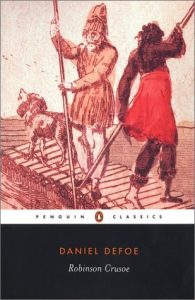

Robinson Crusoe is a compelling tale of survival and self-discovery. Shipwrecked on a deserted island, Crusoe grapples with loneliness, builds a new life, and confronts his beliefs and values. Through his remarkable journey, he navigates the challenges of nature, encounters indigenous cultures, and finds redemption, leaving a lasting impact on literature.
Author: Daniel Defoe
Year of publication: 1719
Pages: 286
Complexity
CEFR: C1
Plot Complexity: moderate
Language Complexity: high
Ideas Complexity: high
Robinson Crusoe showcases a language that is rich and intricate, reflecting the 18th-century context with longer clauses and a wider range of vocabulary. The novel explores profound ideas of survival, self-government, and faith in God, intertwining themes of individualism and religious conviction. The prose is elegantly crafted, capturing the protagonist’s solitude and inner turmoil with introspective depth. Defoe’s masterful storytelling engages readers with its complex language, thought-provoking ideas, and captivating prose, making it a timeless literary work of considerable depth and significance.
Blurb
The sole survivor of a shipwreck, Robinson Crusoe is washed up on a desert island. In his journal he chronicles his daily battle to stay alive, as he conquers isolation, fashions shelter and clothes, first encounters another human being and fights off cannibals and mutineers. With Robinson Crusoe, Defoe wrote what is regarded as the first English novel, and created one of the most popular and enduring myths in literature. Written in an age of exploration and enterprise, it has been variously interpreted as an embodiment of British imperialist values, as a portrayal of ‘natural man’ or as a moral fable. But above all it is a brilliant narrative, depicting Crusoe’s transformation from terrified survivor to self-sufficient master of his island.
YouTube Review
(Video removed? Please notify me at video@rookreading.com)






Be the first to comment